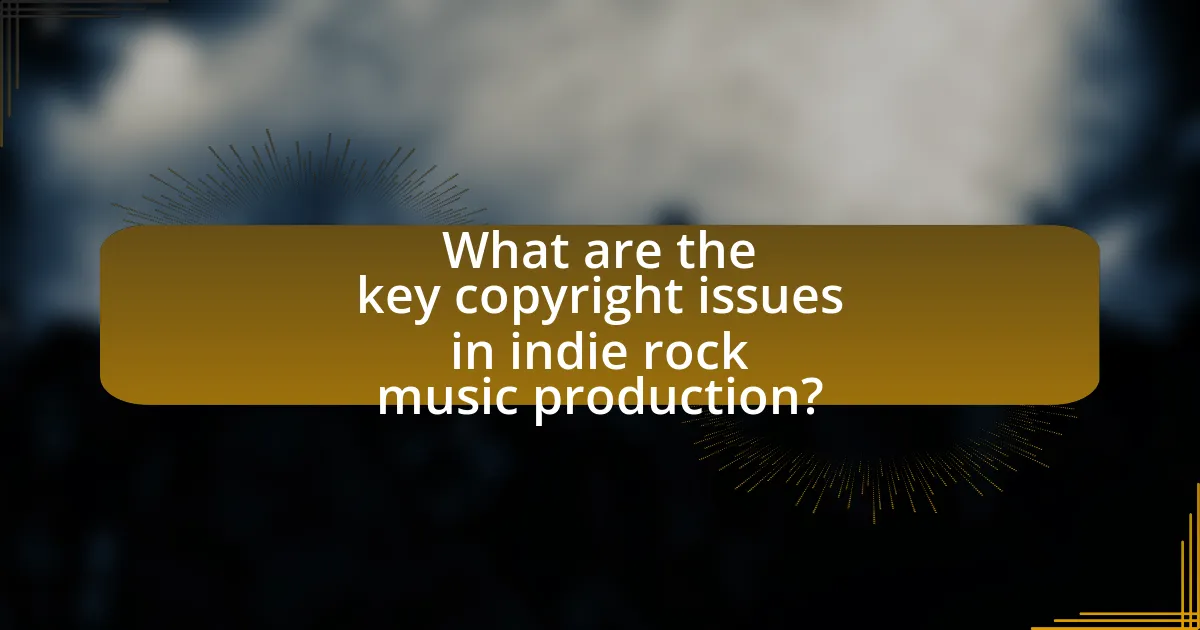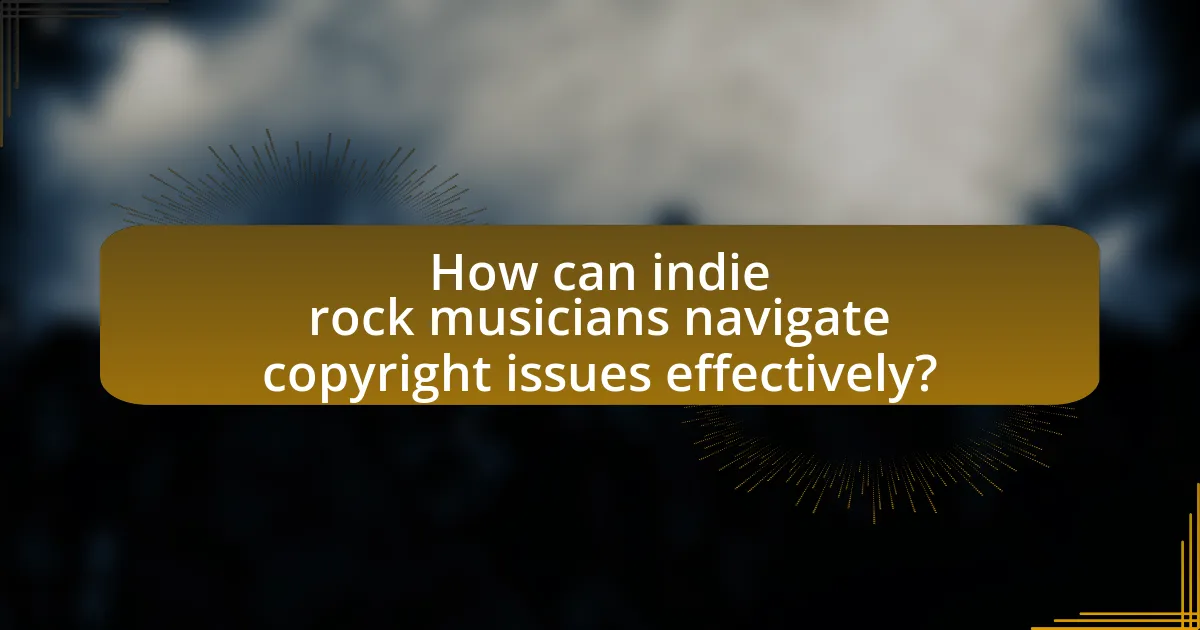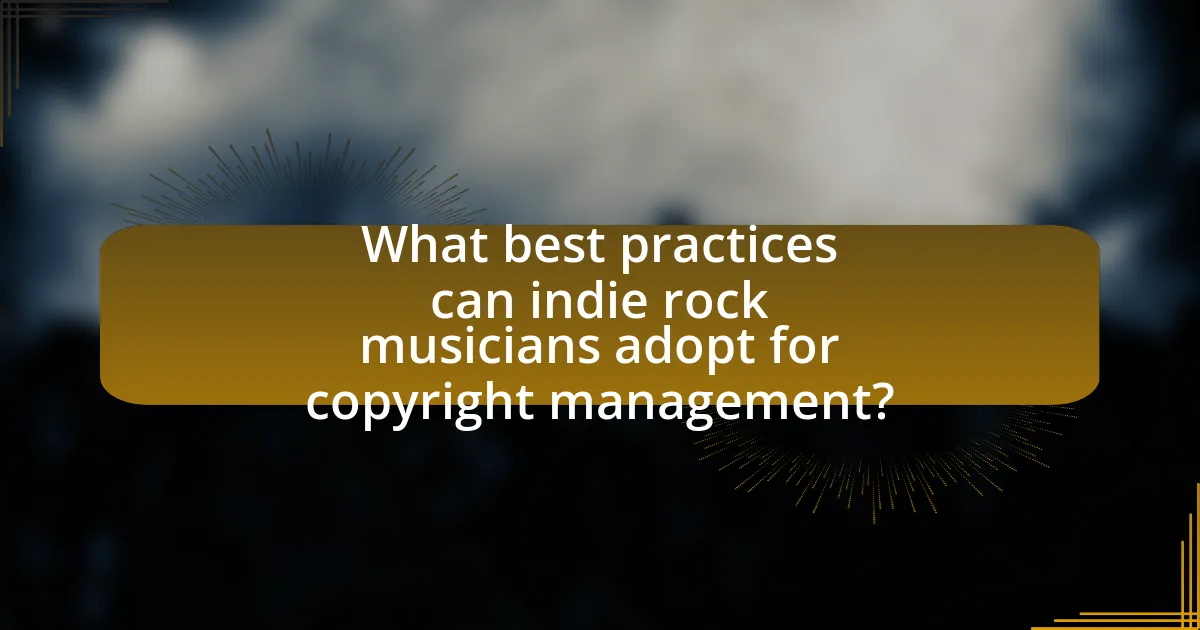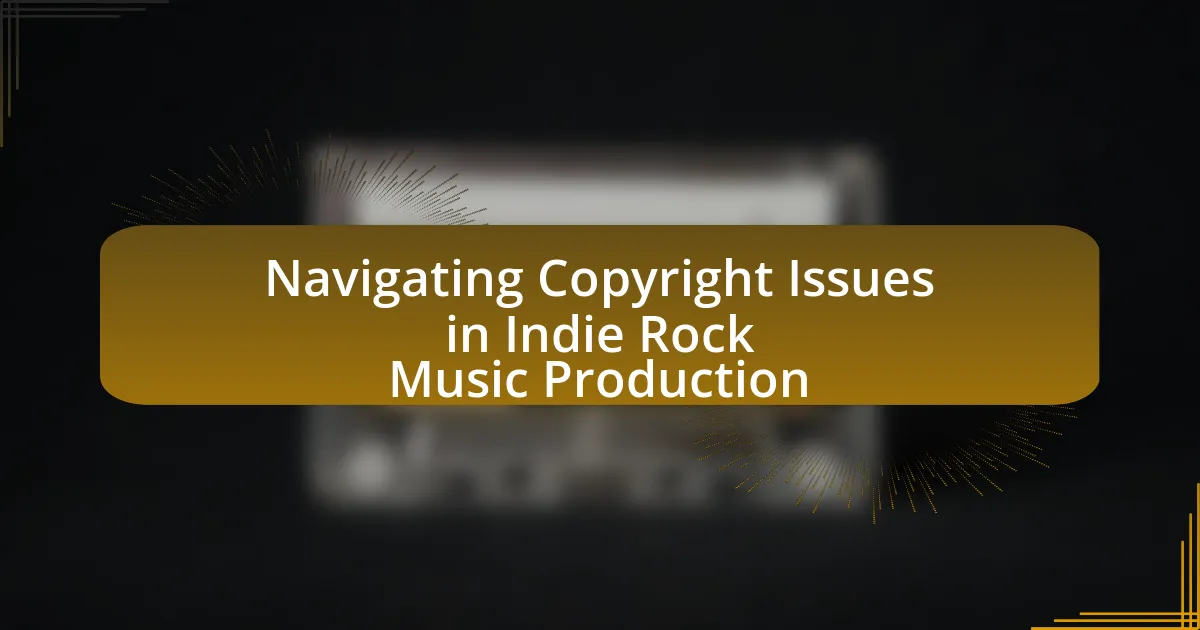The article focuses on navigating copyright issues in indie rock music production, highlighting key concerns such as ownership of original compositions, licensing for samples, and the protection of sound recordings. It explains how copyright law applies to indie artists, detailing the types of copyright protections available and the challenges faced by independent musicians in managing their rights. The article also outlines best practices for copyright management, including registration with the U.S. Copyright Office, the importance of licensing agreements, and strategies for preventing disputes with collaborators. Additionally, it addresses common misconceptions about copyright and provides resources for indie musicians to effectively navigate the complexities of copyright law.

What are the key copyright issues in indie rock music production?
Key copyright issues in indie rock music production include ownership of original compositions, licensing for samples, and the protection of sound recordings. Ownership is crucial as it determines who holds the rights to the music created; typically, songwriters and producers must clearly define their shares to avoid disputes. Licensing for samples is another significant issue, as using existing music without permission can lead to legal challenges; for instance, a 2019 case highlighted how unauthorized sampling can result in costly lawsuits. Additionally, the protection of sound recordings under copyright law ensures that artists retain control over their recorded performances, which is vital for revenue generation in the indie music scene.
How does copyright law apply to indie rock music?
Copyright law protects the original works of indie rock music by granting creators exclusive rights to their compositions and recordings. This legal framework ensures that indie rock artists can control the reproduction, distribution, and public performance of their music, thereby safeguarding their intellectual property. According to the U.S. Copyright Office, copyright protection is automatic upon the creation of a work, meaning that indie rock musicians do not need to register their music to obtain rights, although registration provides legal advantages in enforcement. Additionally, the Digital Millennium Copyright Act (DMCA) addresses online distribution, which is particularly relevant for indie rock artists who often rely on digital platforms for promotion and sales.
What are the main types of copyright protections available for music?
The main types of copyright protections available for music include composition copyright, sound recording copyright, and performance rights. Composition copyright protects the underlying musical work, including melody and lyrics, while sound recording copyright safeguards the specific recording of that composition. Performance rights grant the creator the ability to control how their music is performed publicly, ensuring they receive compensation for live performances and broadcasts. These protections are established under the U.S. Copyright Act of 1976, which provides a legal framework for the ownership and use of musical works.
How do copyright laws differ for indie artists compared to major labels?
Copyright laws apply equally to indie artists and major labels, but the way these entities navigate and enforce those laws differs significantly. Indie artists often retain more control over their work, allowing them to manage their copyrights independently, while major labels typically have extensive resources and legal teams that handle copyright registration, enforcement, and licensing on behalf of their artists. This disparity can lead to indie artists facing challenges in protecting their rights due to limited resources, whereas major labels can leverage their influence to secure broader protections and negotiate favorable terms. Additionally, indie artists may rely on platforms like Creative Commons for licensing, while major labels often utilize traditional copyright frameworks to maximize revenue from their intellectual property.
What challenges do indie musicians face regarding copyright?
Indie musicians face significant challenges regarding copyright, primarily due to limited resources and knowledge about copyright laws. Many indie artists struggle to navigate the complexities of copyright registration, which is essential for protecting their original works. According to a 2021 survey by the Music Industry Research Association, 70% of independent musicians reported confusion about copyright processes, leading to unprotected music and potential infringement issues. Additionally, the lack of legal representation often results in indie musicians being unable to enforce their rights effectively, making them vulnerable to unauthorized use of their music.
How can indie artists protect their original works?
Indie artists can protect their original works by registering their music with the U.S. Copyright Office, which provides legal recognition and the ability to enforce rights against infringement. Registration establishes a public record of the copyright and is necessary for filing a lawsuit for infringement. Additionally, artists should consider using Creative Commons licenses to specify how others can use their work while retaining certain rights. According to the U.S. Copyright Office, copyright protection is automatic upon creation, but registration enhances legal protections and potential damages in case of infringement.
What are the consequences of copyright infringement for indie musicians?
Copyright infringement for indie musicians can lead to significant legal and financial consequences. When an indie musician uses copyrighted material without permission, they may face lawsuits from copyright holders, resulting in costly legal fees and potential damages that can reach thousands of dollars. Additionally, copyright infringement can lead to the loss of revenue from music sales and streaming, as platforms may remove infringing content or suspend accounts. According to the U.S. Copyright Office, unauthorized use of copyrighted works can also result in statutory damages ranging from $750 to $30,000 per work, which can severely impact an indie musician’s financial stability and career growth.

How can indie rock musicians navigate copyright issues effectively?
Indie rock musicians can navigate copyright issues effectively by understanding copyright law, registering their works, and utilizing licensing agreements. Knowledge of copyright law allows musicians to protect their original compositions and recordings, ensuring they have exclusive rights to their music. Registering works with the U.S. Copyright Office provides legal documentation that can be crucial in disputes, as it establishes ownership and eligibility for statutory damages. Additionally, utilizing licensing agreements when collaborating with other artists or using samples ensures that all parties understand their rights and obligations, reducing the risk of infringement. According to the U.S. Copyright Office, registration not only protects the work but also enhances the ability to enforce rights in court, making it a vital step for musicians.
What steps should indie artists take to ensure copyright compliance?
Indie artists should register their original works with the U.S. Copyright Office to ensure copyright compliance. This registration provides legal protection and establishes a public record of ownership, which is crucial in case of infringement disputes. Additionally, artists must avoid using copyrighted material without permission, including samples, lyrics, or melodies from other artists, as this can lead to legal repercussions. They should also consider using Creative Commons licenses for their works if they wish to allow certain uses while retaining some rights. Furthermore, indie artists should educate themselves about fair use provisions, which can sometimes allow limited use of copyrighted material without permission, but this is often a complex area requiring careful consideration. By following these steps, indie artists can protect their creative output and navigate copyright issues effectively.
How can musicians register their works for copyright protection?
Musicians can register their works for copyright protection by submitting an application to the U.S. Copyright Office. This process involves completing a form, paying a fee, and providing a copy of the work being registered. The U.S. Copyright Office, established under the Copyright Act of 1976, allows musicians to secure their rights and provides legal evidence of ownership, which is crucial for enforcing those rights in case of infringement.
What role do music licensing agreements play in copyright navigation?
Music licensing agreements are essential for navigating copyright in the music industry, as they provide legal permission to use copyrighted material. These agreements outline the terms under which music can be used, ensuring that creators receive compensation and recognition for their work. For instance, a synchronization license allows a filmmaker to use a song in a movie, while a mechanical license permits the reproduction of a song on physical media. By clearly defining rights and obligations, music licensing agreements help prevent legal disputes and facilitate the lawful use of music in various contexts, thereby supporting the economic viability of artists and producers in indie rock music production.
What resources are available for indie musicians dealing with copyright?
Indie musicians can access several resources for dealing with copyright issues, including the U.S. Copyright Office, which provides information on how to register works and understand copyright law. Additionally, organizations like the American Society of Composers, Authors, and Publishers (ASCAP) and Broadcast Music, Inc. (BMI) offer support in licensing and royalties. Legal aid clinics and online platforms such as LegalZoom provide affordable legal advice tailored to musicians. Furthermore, educational resources like the Berklee College of Music’s online courses cover copyright fundamentals. These resources collectively empower indie musicians to navigate copyright complexities effectively.
How can organizations and online platforms assist indie artists with copyright issues?
Organizations and online platforms can assist indie artists with copyright issues by providing legal resources, educational materials, and tools for copyright registration. For instance, organizations like the American Society of Composers, Authors and Publishers (ASCAP) offer guidance on copyright laws and help artists register their works, ensuring they receive royalties for their music. Additionally, online platforms such as SoundCloud and Bandcamp often include features that help artists manage their rights and provide information on how to protect their intellectual property. These resources are crucial, as they empower indie artists to navigate the complexities of copyright law effectively, thereby safeguarding their creative works.
What are some common misconceptions about copyright in the music industry?
Common misconceptions about copyright in the music industry include the belief that copyright protection is automatic upon creation, that registering a copyright is unnecessary, and that using samples from other songs is always illegal. Copyright protection indeed arises automatically when a work is created and fixed in a tangible medium, but registration with the U.S. Copyright Office provides legal advantages, such as the ability to sue for infringement and eligibility for statutory damages. Additionally, while using samples without permission can lead to legal issues, certain uses may fall under fair use, which allows limited use of copyrighted material without permission under specific circumstances. These misconceptions can lead to significant legal challenges for artists and producers in the music industry.

What best practices can indie rock musicians adopt for copyright management?
Indie rock musicians can adopt several best practices for copyright management, including registering their works with the U.S. Copyright Office to establish legal ownership and protect their music from unauthorized use. By doing so, musicians can secure exclusive rights to reproduce, distribute, and publicly perform their songs, which is crucial for monetization. Additionally, they should utilize digital distribution platforms that offer built-in copyright protection features, ensuring their music is monitored for unauthorized use online. Furthermore, musicians can consider using Creative Commons licenses to specify how others may use their work while retaining certain rights. These practices are supported by the fact that registered works are eligible for statutory damages and attorney fees in case of infringement, making copyright registration a vital step for indie artists.
How can indie artists effectively manage their copyrights?
Indie artists can effectively manage their copyrights by registering their works with the U.S. Copyright Office, which provides legal protection and establishes ownership. This registration process not only safeguards their music but also enables them to pursue legal action against infringement. Additionally, indie artists should utilize digital distribution platforms that offer built-in copyright management tools, ensuring their music is protected across various streaming services. According to the U.S. Copyright Office, registering a copyright can significantly enhance an artist’s ability to enforce their rights and claim statutory damages in case of infringement.
What tools and software can help with copyright tracking and management?
Tools and software that can assist with copyright tracking and management include TuneCore, DistroKid, and Songtrust. TuneCore provides digital distribution and copyright management services, allowing artists to track their music’s performance and royalties across various platforms. DistroKid offers similar services, enabling musicians to manage their copyrights and collect earnings from streaming services efficiently. Songtrust specializes in global music publishing administration, helping songwriters register their works and ensure they receive royalties from various sources. These tools are widely used in the music industry, particularly by independent artists, to streamline copyright management and maximize revenue.
How can collaboration with other artists affect copyright ownership?
Collaboration with other artists can significantly affect copyright ownership by creating joint works, which typically results in shared ownership rights. When multiple artists contribute to a piece, copyright law generally recognizes them as co-authors, meaning they collectively hold rights to the work unless otherwise agreed upon. For instance, the U.S. Copyright Act stipulates that co-authors have equal rights to use and license the work, which can lead to disputes if not clearly defined in a written agreement. This shared ownership can complicate decisions regarding distribution, royalties, and licensing, as all parties must agree on how to proceed.
What are the common pitfalls to avoid in copyright management?
Common pitfalls to avoid in copyright management include failing to secure proper licenses, neglecting to register works, and misunderstanding fair use. Securing proper licenses is crucial, as using copyrighted material without permission can lead to legal disputes. Neglecting to register works with the U.S. Copyright Office can limit the ability to enforce rights and seek damages in case of infringement. Misunderstanding fair use can result in unintentional violations, as fair use is often misinterpreted, leading to unauthorized use of protected content. These pitfalls can significantly impact the financial and legal standing of indie rock music producers.
How can indie musicians prevent copyright disputes with collaborators?
Indie musicians can prevent copyright disputes with collaborators by establishing clear written agreements that outline ownership rights and responsibilities. These agreements should specify how contributions are categorized, such as lyrics, melodies, and production elements, and detail how profits will be shared. According to the U.S. Copyright Office, having a written contract is essential for clarifying the intentions of all parties involved, which significantly reduces the likelihood of misunderstandings and disputes. Additionally, documenting the creative process through timestamps and drafts can serve as evidence of contributions, further protecting the rights of each collaborator.
What strategies can be employed to resolve copyright conflicts amicably?
To resolve copyright conflicts amicably, parties can engage in open communication and negotiation to reach a mutually beneficial agreement. This approach allows for the clarification of rights and expectations, fostering a collaborative environment. Mediation can also be employed, where a neutral third party facilitates discussions, helping to identify common ground and potential solutions. Additionally, establishing clear licensing agreements upfront can prevent misunderstandings and disputes, as evidenced by the fact that many successful indie rock artists utilize detailed contracts to outline usage rights and compensation. These strategies promote a cooperative resolution process, reducing the likelihood of escalation into legal battles.
What practical tips can indie musicians implement for copyright success?
Indie musicians can achieve copyright success by registering their works with the U.S. Copyright Office, which provides legal protection and establishes ownership. This registration process is crucial because it allows musicians to enforce their rights in case of infringement, as evidenced by the fact that registered works can qualify for statutory damages and attorney’s fees in litigation. Additionally, musicians should utilize Creative Commons licenses to clarify how their music can be used by others, promoting sharing while retaining certain rights. Keeping detailed records of all creative processes, including drafts and recordings, further strengthens claims of ownership and originality. Lastly, musicians should consider consulting with a copyright attorney to navigate complex legal landscapes effectively, ensuring that their rights are fully protected.
